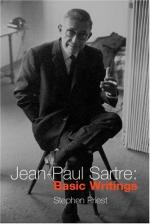|
This section contains 1,113 words (approx. 4 pages at 300 words per page) |

|
SARTRE, JEAN-PAUL (1905–1980), French philosopher and man of letters, is generally regarded as the chief exponent of the atheistic branch of existentialism. Soon after World War II, Sartre wrote in Existentialism and Humanism (London, 1948): "Atheistic existentialism, of which I am a representative, declares … that if God does not exist there is at least one being whose existence comes before its essence, a being which exists before it can be defined by any conception of it. That being is man" (pp. 27–28). Sartre's existentialism, given its most sophisticated expression in Being and Nothingness: An Essay on Phenomenological Ontology (New York, 1956), is a philosophy of human reality that views human beings without recourse to any divine creator, that is, without appeal to God. Neither a virulent nor a polemical atheist, Sartre is not interested in the traditional philosophical or theological proofs for the existence of God. It would be more...
|
This section contains 1,113 words (approx. 4 pages at 300 words per page) |

|


